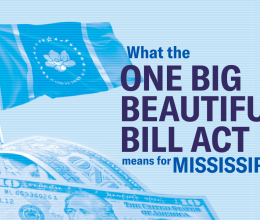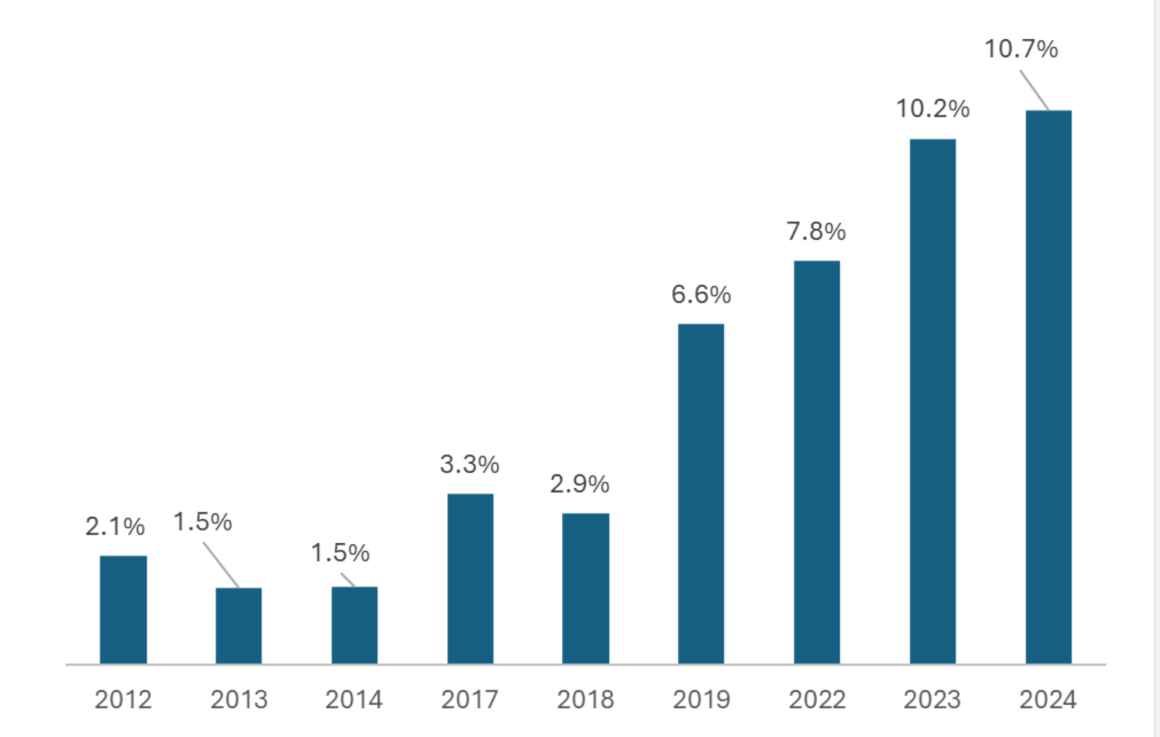
The One Big Beautiful Bill Act (OBBA) introduces unprecedented requirements for states by imposing cost-sharing penalties tied to Supplemental Nutrition Assistance Program (SNAP) error rates. This approach dangerously expands the use of discretionary power, putting food security for low-income families at risk. A historical account of Southern politics reveals why such discretion can be so harmful to low-income families across Mississippi. The ACLU of Mississippi offers a historical analysis of how SNAP benefits have been administered in the state and draws clear connections to the present-day context.
In the pilot food stamp program of 1964, low-income individuals were required to purchase food stamps, "paying an amount commensurate with their normal expenditures for food and receiving an amount of food stamps representing an opportunity more nearly to obtain a low-cost nutritionally adequate diet" (USDA, 2025). However, a significant shift in the burden of cost occurred in 1977, when the federal government eliminated the purchase requirement. A pivotal moment leading to this change took place in Mississippi in 1967, marking the beginning of a broader reconsideration of who should bear the cost of access to nutritional assistance.
Although the Food Stamp Program was designed with the intent to alleviate hunger, its implementation was undermined by the discretion granted to state and local administrators. In Mississippi, this discretionary power resulted in poor execution of the program. The purchase requirement, which expected low-income individuals to buy food stamps upfront, failed to meet the needs of the most vulnerable populations. This failure was most evident in the Mississippi Delta, where a surplus of unemployed Black farm workers faced worsening poverty. This crisis was fueled by the growing mechanization of agriculture and racially motivated retaliation in response to civil rights legislation.
Motivated by a desire to address food insecurity, Marian Wright Edelman invited the Senate Subcommittee on Poverty to Mississippi for several field hearings across the state, aiming to give lawmakers a firsthand look at how payment requirements were impacting American citizens. The field hearings took place in Jackson, Greenville, and Clarksdale. However, Mississippi legislators not only declined to attend the hearings but also refused to acknowledge hunger as a prominent issue in the state. In fact, during the highly publicized poverty tour, Mississippi Governor Paul Johnson stated, “All the Negroes I’ve seen around here are so fat they shine”(Clarion Ledger, 2016).
The discretionary power held by Mississippi’s legislators in the 1960s allowed them to resist using federal aid intended to implement education and nutrition programs designed to support poor families.
Present-Day Context
Nearly 60 years later, Mississippi families face a similar threat of food insecurity under the Trump administration, as policy decisions once again risk limiting access to critical support for low-income communities.
Under the One Big Beautiful Bill Act (OBBBA), when a state’s Supplemental Nutrition Assistance Program (SNAP) payment error rate reaches 10% or higher, federal law mandates that the state must contribute 15% of the total SNAP benefits paid out (NCSL, 2025). This cost-sharing requirement is designed to incentivize more effective administration and greater accuracy in SNAP payments. According to the Mercatus Policy Center, “Improper payments are those that were made in an incorrect amount, or those that could not be verified as proper due to insufficient documentation”. SNAP measures improper payments using a monthly payment error rate, which includes both overpayments and underpayments, each contributing to inefficiencies and the potential misuse of taxpayer funds.
To better understand the harmful impact of these cost-sharing penalties, we include the most recent payment error rates, projected state costs associated with those rates, and a historical analysis of SNAP payment errors over time. In FY 2024, Mississippi reported a payment error rate of 10.69%, surpassing the federal threshold and triggering the requirement for the state to cover 15% of total SNAP benefit costs, as outlined by the OBBBA (USDA, 2025).
Looking ahead to FY 2028, “Mississippi’s projected obligation under the 15% cost-share requirement is expected to reach $125 million, an amount that exceeds the state’s annual expenditures on essential public health services such as drinking water testing, infectious disease prevention and surveillance, and fire safety” (Center on Budget and Policy Priorities, 2025).
Figure 1 illustrates SNAP payment error rates for Mississippi from 2012 through 2024.

Note: Data prepared by USDA Food and Nutrition Service. Payment error rates for 2015, 2016, 2020, and 2021 were not available on the USDA website.
Who Bears the Costs?
As illustrated in Figure 1, payment error rates have increased significantly since 2019. While external factors such as the HOPE Act of 2017, COVID-19, and technical vulnerabilities have contributed to these rising rates, the imposition of cost-sharing penalties raises a critical question: who ultimately bears the cost? Mississippi now finds itself at a crossroads: either find a way to reduce its SNAP error rate significantly, or continue bearing a growing share of the program’s cost.
With these decisions looming, the stability of low-income families hangs in the balance. According to the USDA, in 2020 and 2022, Mississippi had significantly lower rates of SNAP participation than two-thirds of the states (USDA, 2025). In 2023, 389,941 Mississippians received SNAP benefits (WJTV,2024). By 2024, the number had declined slightly to 382,734, reflecting a decrease of over 7,000 participants in just one year (WJTV, 2024). The change in eligibility requirements contributes to fluctuations of SNAP program access. In June 2023, Mississippi received approval from the USDA Food and Nutrition Service to waive the SNAP interview requirement for new applications and recertifications (MDHS,2023). However, that waiver expired on May 1, 2024, and the state reinstated the interview requirement for all applicants and recertifying households. Currently, the USDA is offering states the option to waive the face-to-face interview requirement from October 24, 2024, through September 30, 2025, to help alleviate administrative burden on caseworkers. Despite this, Mississippi has not submitted a request to opt in. Notably, administrative burden is a well-documented contributor to SNAP error payments. Yet, when offered a practical solution, Mississippi declined the federal assistance that could have eased access and improved outcomes for low-income families.
When allowed to apply for the Summer Electronic Benefit Transfer (EBT) program for children, Mississippi declined to participate. As a result, thousands of low-income children across the state are left at greater risk of food insecurity during the summer months. While officials from the state welfare agency cited “a lack of state resources to administer the program” as the reason for not participating, Governor Tate Reeves stated that the decision was driven by a desire to ‘not expand the welfare state’ (Mississippi Today, 2024).
Mississippi’s refusal to adopt proven strategies for improving access and accuracy in SNAP reflects a longstanding pattern of prioritizing ideology over need. As history shows, when discretion is used to restrict rather than expand access, it is the poorest families, often communities of color, who pay the price.